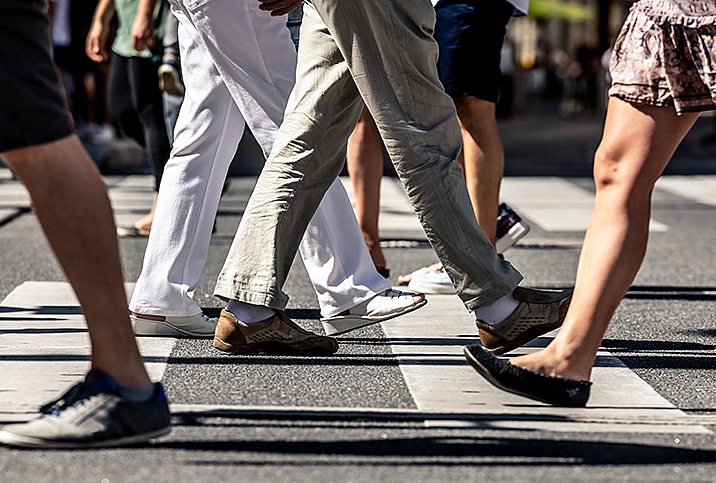The Wonders of Walking: A Simple Exercise With Big Benefits

Starting to exercise or getting into a routine is intimidating for some. There's always a wide array of machines waiting for you at the gym, some of which you may have no idea how to use, and there are pricey workout classes that, in theory, provide direction but are hard to commit to at a high price tag. Even the workout apps at your fingertips can be difficult to sift through in such high volumes.
Whatever your fitness level, walking is a foolproof, low-impact exercise at no cost that's bound to benefit you in some way. Here's a look at what walking can do for you.
No-excuse workout
As outlined above, sometimes the biggest barrier to moving our bodies is the number of excuses we create when it comes to getting started. We're left with choice paralysis or fear of judgment if we're not in the best shape, and so do nothing instead. Walking outside offers an easy outlet for exercising, leaving no room for excuses. Almost anyone at any fitness level or age can incorporate walking into their lifestyle. All you need is a comfy pair of supportive shoes and a few minutes in the day.
Mental health benefits
While you may be aware of some of the physical benefits of walking, you may be surprised by how much it can affect your mind for the better.
Physical exercise is widely known to help alleviate anxiety and stress, and boost overall mood. Walking can help get your heart rate up, allowing for the release of endorphins, which make you feel good. This chain of events can lead to increased self-esteem and higher libido, and help you sleep better. Walking for even 30 minutes every day can give a significant boost to your overall mood.
If you're feeling the effects of a mood disorder, such as depression, studies show spending more time outside can help manage these disorders. Being away from the stressors of our daily lives, such as work, chores and errands, and instead immersing ourselves in nature, even if it's just the neighborhood, can do wonders. Walking outside offers a twofold way to combat mental health issues, as it combines fresh air with physical exercise.
Physical health benefits
There are many physical benefits to walking briskly every day. When we think of exercises that help us lose weight and burn fat, we normally associate that with high-intensity activities that leave us in a pool of sweat. But if you're trying to lose weight or maintain your weight, walking burns calories and can help increase your metabolism while being easier on the knees and joints than running. Walking helps increase circulation in the body, allowing for improved blood flow from the heart to the rest of the body, which also contributes to weight loss and overall heart health.
Taking a walk for at least 30 minutes per day can help reduce the risk of developing arthritis, or ease its effects, as it prevents joint stiffness and promotes overall flexibility. Walking at a significant pace can even increase your life expectancy and lower your risk for cardiovascular disease. A 2018 study by the University of Sydney found a correlation between a faster walking pace and a lower rate of all-cause mortality.
Get to stepping
Pick a day and time that works for you and a route that matches the distance you want to go. Make a playlist of your favorite songs or find an audiobook or podcast you've been meaning to check out—or simply enjoy the sounds of your neighborhood.
For maximum me time, turn your phone on do-not-disturb mode and trade the screen for the sight of gardens, birds and trees. Or walk with a friend, significant other or your dog for some companionship. You may find yourself looking forward to the time of day you have carved out for your walks—and watching the miles add up quickly.


















